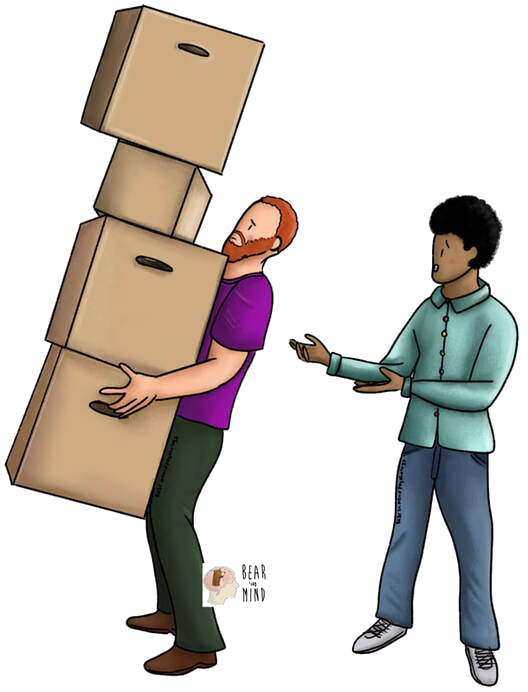Stress Symptoms in Men
Stress is the feeling that lets us know when the pressure upon us is greater than the resources we have available. It’s essentially a resource issue!
Stress is one of the main threat based emotions. The initial urge is to work harder and increase effort so that we push on through which is fine for short term problems that pass. However, if the added demand(s) become the norm, using this strategy can lead to problems and pushing through might not work. At this point we have to take a step back, accept we cannot do everything, redistribute our resources and asked for additional support.
In modern day, stress is a common emotion that people feel. It’s linked to the release of cortisol and a sense of pressure or tension linked to real and perceived demands. Having awareness of stressors enables us to look for ways to reduce demands and restore a more manageable normal.

Stress is linked to our workloads, too many long days in the office, with too much work to get through. It’s linked to our high competitiveness in settings and the need to do more than the next person. It’s also closely linked with anxiety because of the dangers that might result if we don’t get things done in good time.
We can also find stressors in other areas of our lives including our relationships, interests, social media, paying rents, meeting the bills, bulling, the pressure to provide, parenting, kids going leaving home, family illness, divorce, losing everything you worked so hard for………the list goes on and on.The problem is we only have so much to go around. If we are already full to capacity any additional and unexpected demands can mean that we are are easily overstretched. Under these circumstances it many be less easy to spot which is problem carries the biggest burden.
The list of signs of stress in men is long; stress is incredibly unhealthy for us in the long run.
Chest pain
Tightness, dryness or a feeling of a having lump in your throat
Decreased productivity
Pounding heart
Constipation or diarrhoea
Increased smoking
High blood pressure
Indigestion
Increased use of alcohol and drugs
Moodiness, irritability, or anger
Increased perspiration
Job dissatisfaction
Muscle aches, such as back and neck pain
Feelings of insecurity
Changes in close relationships
Headaches
Insomnia
Stomach cramps
Dizziness
Worry
Weight gain or loss
Shortness of breath
Withdrawal
Diminished or increased sex drive
Fatigue
Isolation
Sadness
Frequent colds and infections
Restlessness
Crying
Clenched jaws and grinding teeth
Feeling overwhelmed
Depression
Skin problems like acne
How to Deal with Stress in Men
Recognise that you do have limits and can only do so much
The mind’s natural response to problems is to think about how to resolve them. This is our go to strategy and because it usually works we. This is not always the case and being stuck in persistent problem focused thinking can become a problem due to the negative impact it has on your mood. At times of high stress people often report that their minds are continually focused on their difficulties, even at times when they would usually be doing other things.
This pattern of thinking can get in the way of sleeping, spending time pursuing interests and hobbies, time with family and friends or take time from other places. Although in the short term this can be a choice. Long term it rarely works. Putting limits on what you are willing to give to stressful situations is important in setting boundaries.
At times when you decide to not spend time with stressors it important to learn how to detach from problem focused thinking, give the mind a welcome rest so that it functions optimally and in a balanced way again.
The key is to find moments when you can divert your attention away from the problems you face. This is hard to do because your mind wants to focus on them but it’s essential in giving the mind a rest and keeping it functioning well.
Distraction is a good technique if your thoughts are fused with problems. However, there are more technical ways of achieving relief through practices like mindfulness and attention training that have longer lasting benefits.
Here’s a list of things which can help to with stressful situations:
Let’s turn our lives around and choose happiness over stress!
“Remember that stress doesn’t come from what’s going on in your life. It comes from your thoughts about what’s going on in your life.”
Andrew J. Bernstein
Why do Men Withdraw when Stressed?
As men we have a tendency to want to sort out his problems out ourselves.
This can lead to us focusing more on the problems at the expense of other things in our lives. This can have an impact on those closest to us as we are less able to give them the time and attention they like or deserve. When we experience extreme stress, our whole focus goes towards the problems as we see them and there is little, if any, energy left for relationships, hobbies, interests and the self.
Whilst this makes sense in terms of how we have come to see ourselves as men it can lead us to feel alone and isolated. We might even be angered by others for asking for our time when we have so many things to have to deal with.
We need to remember that asking for help is actually a strength not a weakness. The most successful people in life are those who realise they can’t do everything and neither should they expect this of themselves. Be open to drawing on others to help out if they can. We are much stronger when we work together.
